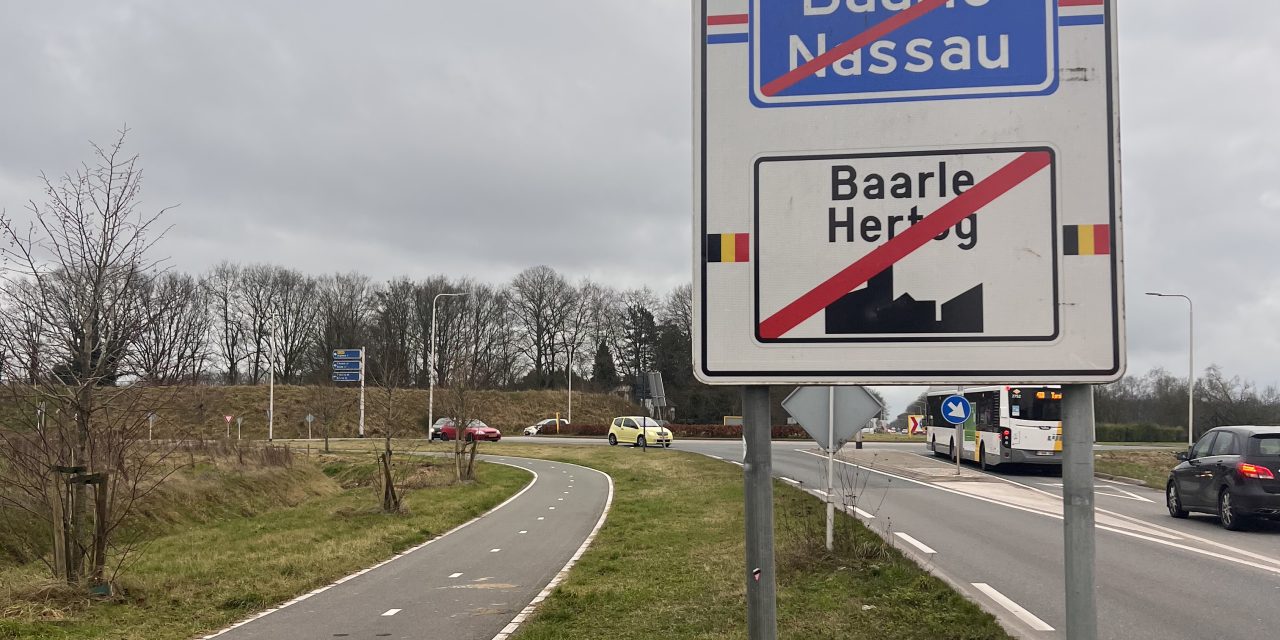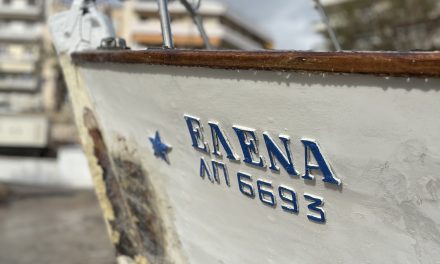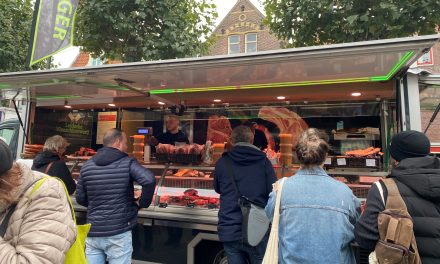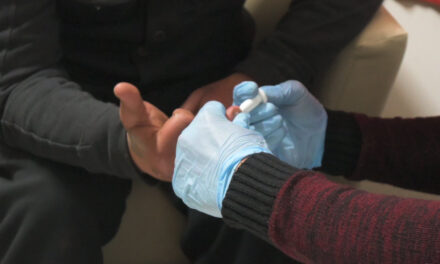It’s a cold day in mid-December, and while there are still 15 days until the new year, the sound of fireworks cracking in the distance can already be heard. It’s not unusual, but the way New Year’s is celebrated differs from one EU country to another. However, there is one country that truly goes all out every year: the Netherlands.
For the Dutch, hearing loud bangs throughout the year has started to feel normal, rather than just during New Year’s celebrations. Almost every week, news articles surface about explosions caused by illegal fireworks, such as the Cobra 6. Videos circulate of cars driving in circles, shooting fireworks at each other through their windows, and people using fireworks to intimidate one another. In 2024 alone, 500 explosions have already been recorded. It seems the Dutch are using fireworks for all the wrong reasons. A small country that, despite numerous bans, just can’t seem to get enough of loud explosions. Yet no matter how many new regulations are introduced, it’s the same story every year.
The reason is simple: the fatal accidents aren’t caused by legal fireworks, but rather by illegal ones that Dutch citizens smuggle across the borders to sell or ignite back home. How can this firework phenomenon in the Netherlands be stopped without action being taken at the European level?
The car windows fog up as the engine starts, marking the beginning of a 40-minute drive to the destination. It’s much closer than a trip to Italy or Poland, but the result is the same and with fewer risks. It’s no surprise that with illegal fireworks so easily accessible, many Dutch people partake. Cobras and shells, fireworks to some, but in reality, they are powerful explosives that have little to do with “celebrating” the New Year. The numbers make it clear: the issue isn’t the legal fireworks that the average Dutch person sets off, but the heavy, illegal fireworks that cause fatal accidents year after year.
Different rules
There’s an entire European supply chain behind the fireworks before they even reach the Netherlands. According to Leo Groeneveld, founder of a fireworks advocacy group, illegal fireworks originate from countries like Poland and, especially, Italy. “Many Dutch people also go to Belgium and Germany to buy fireworks. Light fireworks are still allowed there, so they can be purchased legally. A lot of Dutch people head to Belgium for louder and more spectacular fireworks, as well as for firecrackers and rockets. The town of Baarle-Hertog is the firework hotspot where many Dutch citizens purchase their stash every year. 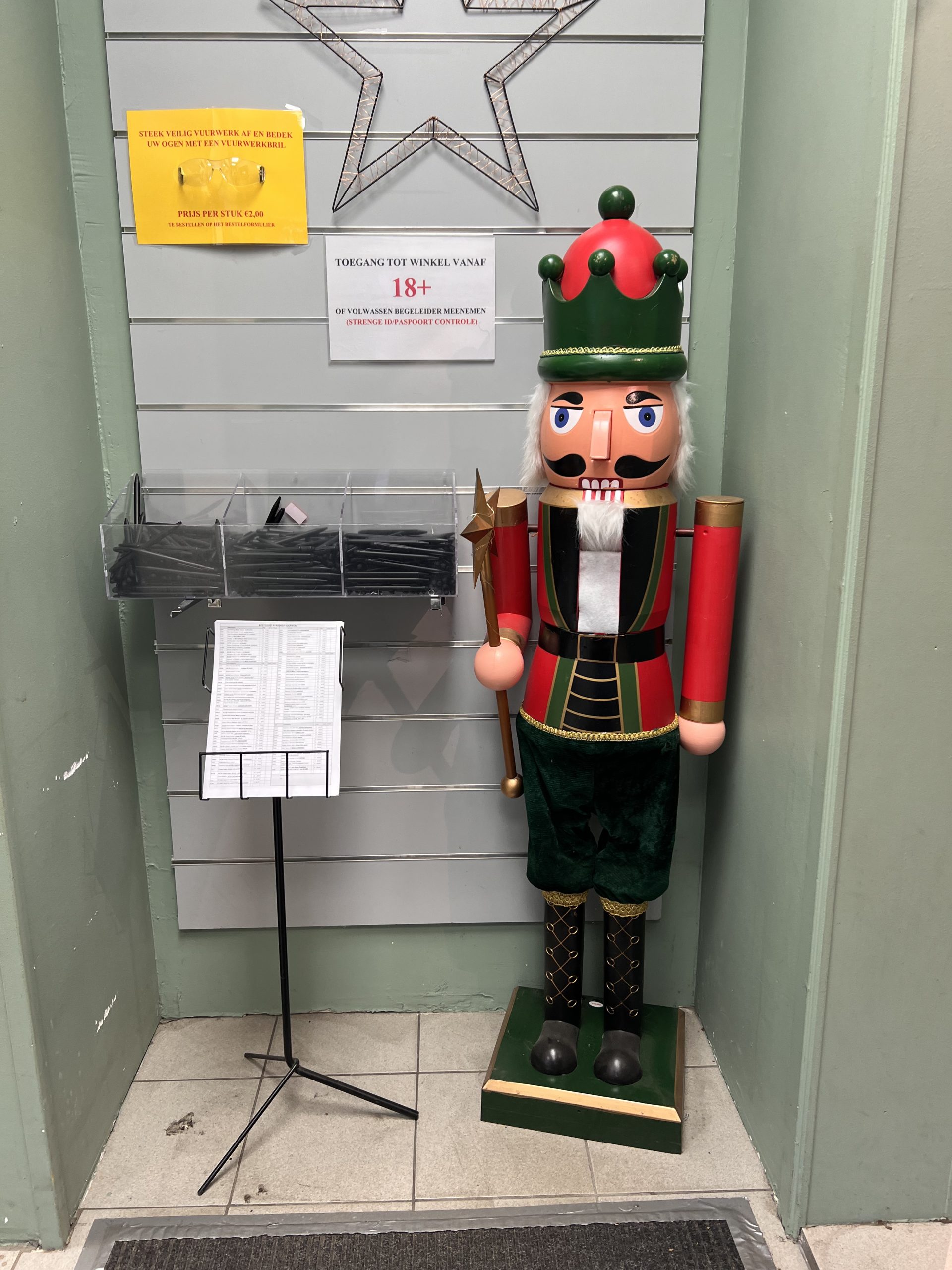 The town is located right in the middle of the Netherlands. With an area of just 7.41 square kilometers, you can cross the border in five minutes and bring Belgian fireworks back into the Netherlands. There are large signs at the border warning about firework checks, but where the police really is, is unclear. Cars packed with fireworks cross the border right in front of me. ‘I usually just take backroads to avoid being stopped by the police,’ says Liam, who I meet at the Zena fireworks shop. Liam isn’t the only Dutch person here; in fact, everyone in the shop seems to be Dutch. Upon entering, you’re handed a clipboard and a pencil to mark off which fireworks you want. Once submitted, your order is ready for pickup within minutes. Fathers and sons carry out towering boxes of fireworks, while others bring hand trolleys to haul their purchases. ‘It’s just tradition. I do it every year. The fireworks here are prettier and cheaper, so why not?’ says Menno, who is waiting for his order next to me at the pickup point. ‘We’re not doing anything illegal; we follow all the Belgian laws,’ says the Zena shop owner. And he’s right, Belgium’s firework regulations are different from those in the Netherlands.
The town is located right in the middle of the Netherlands. With an area of just 7.41 square kilometers, you can cross the border in five minutes and bring Belgian fireworks back into the Netherlands. There are large signs at the border warning about firework checks, but where the police really is, is unclear. Cars packed with fireworks cross the border right in front of me. ‘I usually just take backroads to avoid being stopped by the police,’ says Liam, who I meet at the Zena fireworks shop. Liam isn’t the only Dutch person here; in fact, everyone in the shop seems to be Dutch. Upon entering, you’re handed a clipboard and a pencil to mark off which fireworks you want. Once submitted, your order is ready for pickup within minutes. Fathers and sons carry out towering boxes of fireworks, while others bring hand trolleys to haul their purchases. ‘It’s just tradition. I do it every year. The fireworks here are prettier and cheaper, so why not?’ says Menno, who is waiting for his order next to me at the pickup point. ‘We’re not doing anything illegal; we follow all the Belgian laws,’ says the Zena shop owner. And he’s right, Belgium’s firework regulations are different from those in the Netherlands.
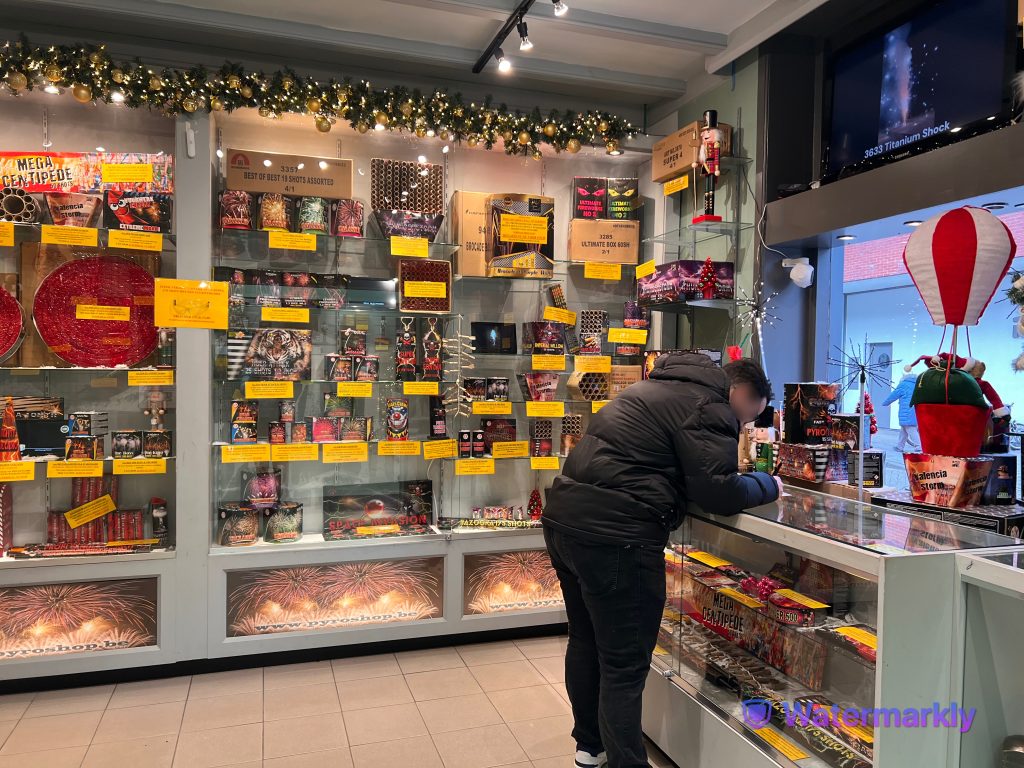
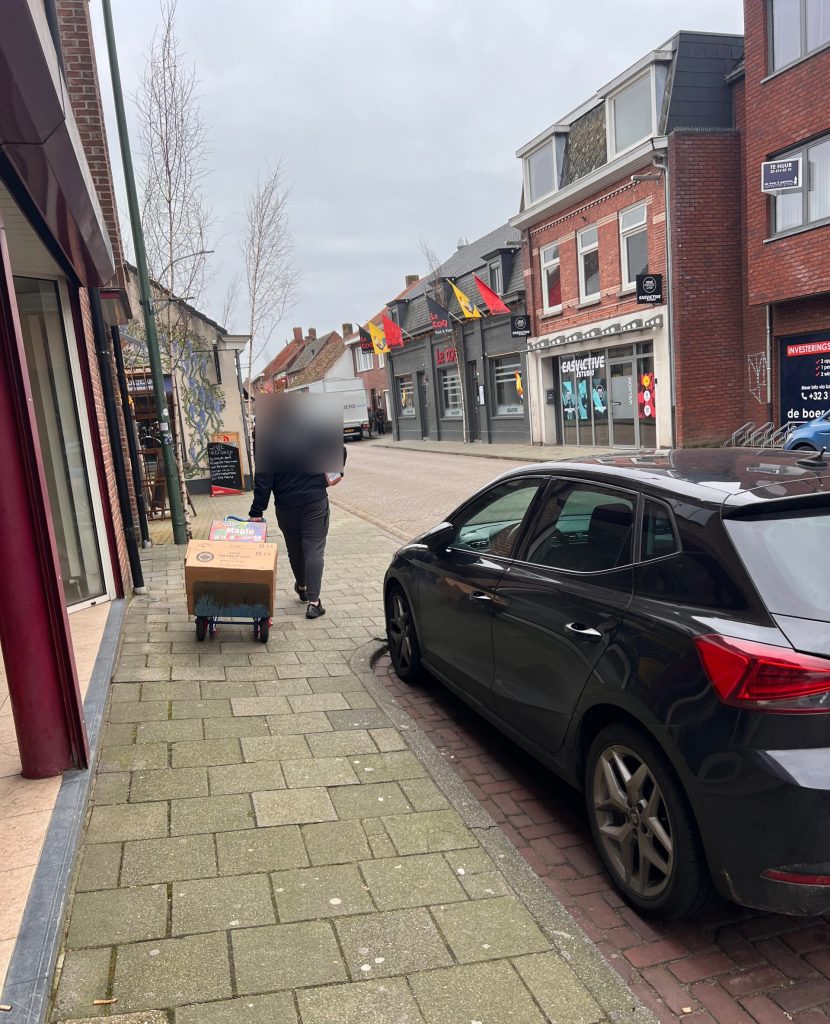
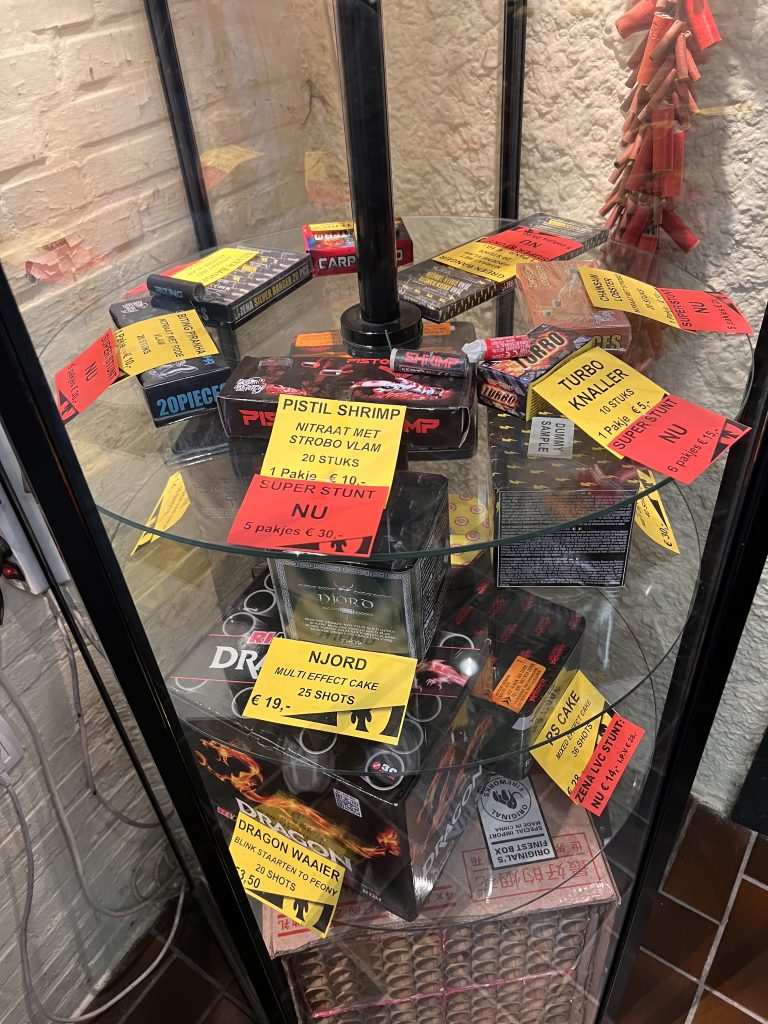
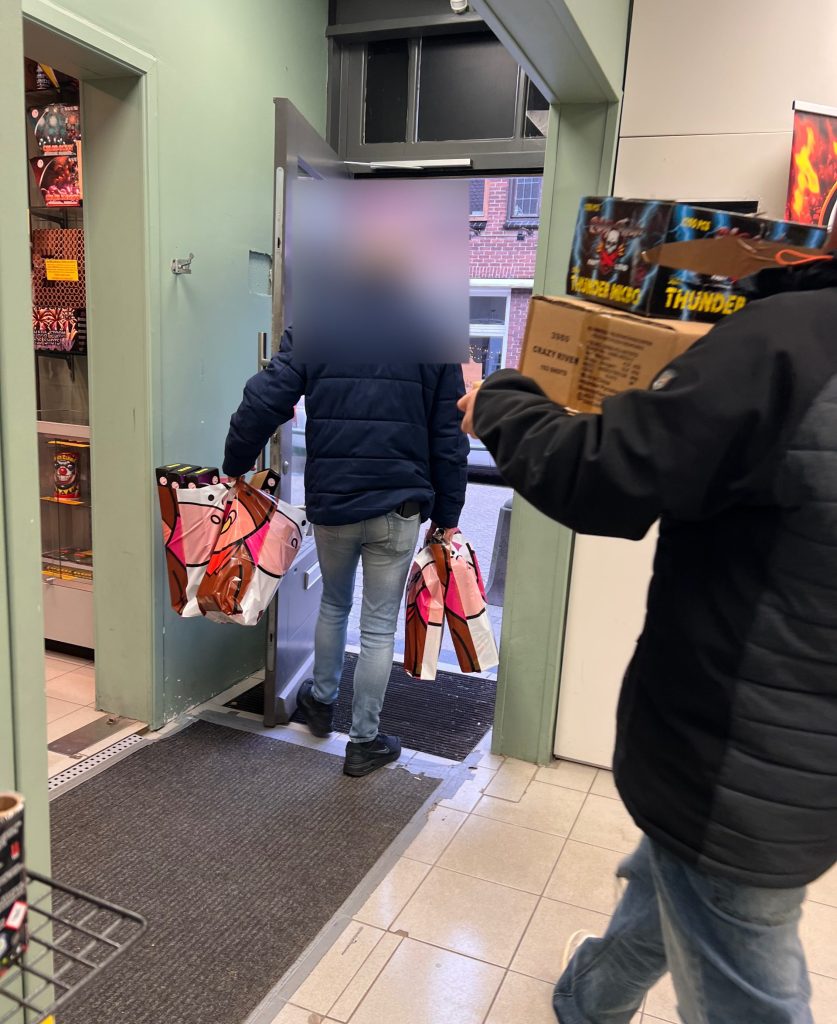
So, how do the firework laws differ across Europe? Watch the video explainer to learn more.
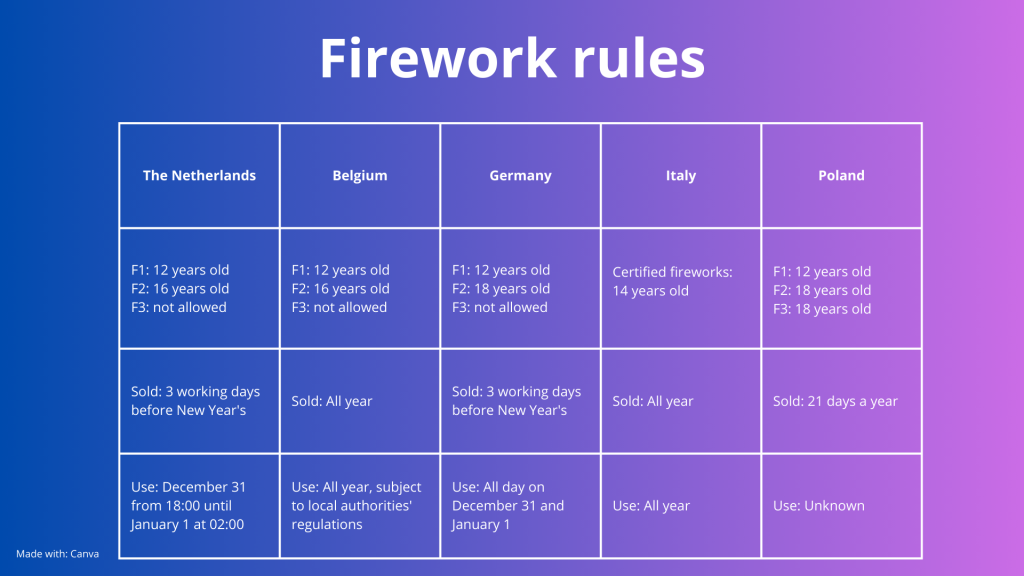
The rules surrounding fireworks vary from country to country, making national regulations harder to enforce. If you can’t get fireworks in your own country, chances are you can in a neighboring one. ‘It’s like the coffee shops in the Netherlands, foreigners come there to buy weed. It’s the same with fireworks: Dutch people come here to buy them,’ says the Zena shop owner. He explains that 95% of his customers are Dutch. When I ask him why there are so many more accidents involving firecrackers in the Netherlands compared to Belgium, he explains: ‘The thing is, there’s no ban on firecrackers here in Belgium, and you can buy fireworks year-round. It’s not such a big deal here as it is for the Dutch around New Year’s. But when you ban something, like in the Netherlands, it makes people want to do it even more.’
‘Still, you must remember that most big accidents happen with the really heavy illegal stuff, and we don’t sell that here. It’s a shame that those kinds of explosives are considered “fireworks” in the media because it puts all fireworks in a bad light’, adds the cashier at Zena. Leo Groeneveld agrees, criticizing the amount of misinformation spread about fireworks and how journalists often report statistics out of context. ‘It creates so much negativity around the word “fireworks”, when the real issue is heavy explosives.’
There are now only 25 minutes left before I reach Damien who sells these heavy explosives. The thought of someone storing and selling these without concern for where they end up or how they’re used is unsettling. But he, too, sources them illegally. It’s a trade that crosses many European borders yet has severe consequences for countries struggling to control it. How is it possible that such deadly products can be produced in such large quantities in Europe?
How fireworks are traded between countries, see the video here:
Netherlands door Naomi Suithoff
EU-laws
According to Groeneveld, the issue lies in a specific clause of the European Pyrotechnics Directive. ‘The main problem is that this directive allows the use of flash powder in products classified as “bangers.” This type of powder, known as aluminum percolate, is highly volatile and produces loud explosions. While the directive doesn’t limit its use, national guidelines, like those in the Netherlands, often cap the amount of flash powder at 15 grams. But for bangers, there’s no such restriction. This means you can legally make a Cobra with up to 200 grams of flash powder, far more powerful than a hand grenade. I’ve tested this myself in Germany, and the force is immense.’
These products are legally produced and even carry a CE mark, complying with regulations. ‘The problem is that the directive specifies these products are only for professionals with permits. But the factories producing these explosives do not adhere to this at all.’
Why Unified Fireworks Legislation Remains a Challenge
Creating a unified European policy would also be ideal, according to Groeneveld. But the first step is to ensure that the current Pyrotechnics Directive is amended. However, previous initiatives have proven ineffective. “In 2008, together with Professor Griesenveld, I already made a plea to the ministry, urging them to address this issue at the European level as quickly as possible and to bring it to the EU’s attention because we could already see it coming. But to this day, nothing has changed. Just think about that, it’s been that long. And it’s only getting worse because criminals are exploiting it. This trade is entirely in the hands of criminals right now. And yes, the louder it bangs, the more interesting it becomes; the more explosive the material, the more appealing it is.” As a result, Dutch people continue to misuse these explosives, in Germany illegal fireworks are used to blow up houses during New Year’s Eve, and the real fireworks are overshadowed by this mess.
Still, it’s challenging to ensure that all countries in Europe follow the same rules because New Year’s Eve looks different in each country. For example, in Germany, the rocket is sacred, whereas in the Netherlands, cakes with multishots are more significant. “In Spain, for example, it’s entirely different from the Netherlands. There, people don’t care about display fireworks; they just want loud bangs. So if you want to align the Netherlands and Spain, it’s tough because, in Spain, they use firecrackers with six grams of perchlorate, which is deafening. But the Spaniards don’t blow up ATMs with it, whereas in the Netherlands, we do. So it’s quite difficult to harmonize European legislation.”
However, with six grams per firecracker, you can’t commit an ATM explosion, which you can with 200 grams. So it starts with limiting the number of grams. Once that is done, countries can fall back on that legislation internationally.
Just 10 minutes left until I arrive at Damien’s place. Because of his illegal activities, he doesn’t want his last name mentioned or described. Still, he was willing to tell me about his trade.
Germany’s role in the fight against illegal fireworks: A crucial player
In Germany and Austria, you’re also seeing growth in the illegal fireworks market right now. What you do see is that industry organizations in Germany, Austria, and Switzerland are becoming more alert. “This is actually good because the German industry association is the most powerful in Europe. And most fireworks are imported through those importers in Germany. If they fully supported tackling the European directive, I’m convinced it would happen much faster than if someone in the Netherlands says, ‘We should do something about this.’ In the Netherlands, it often doesn’t go beyond that,” says Leo Groeneveld.
And why hasn’t the German association acted yet? Well, because the problem isn’t as significant in Germany as it is in the Netherlands. “Yes, that’s the case. In Germany, they deal with much less illegal fireworks-related issues than in the Netherlands, although it’s starting to increase now.” That is also what we saw during this new year in Berlin, where according to various German media outlets, fireworks accidents during New Year’s celebrations in Berlin left 42 people seriously injured and destroyed 36 homes. Authorities in the German capital arrested around 330 individuals for illegally setting off fireworks.
The reseller
I arrive on the street where I need to be. A regular street with semi-detached houses and children playing soccer further down the road. So innocent. I ring the doorbell, and soon a young man opens the door. “Hi, come in, come in.” After politely offering me a drink, we sit at the table. He makes it clear upfront that everything must remain anonymous, but after reassuring him, Damien answers my questions openly. It might seem like a simple question, but it’s the burning question I have: why do you do this? “Well, I just make money from it, and if they don’t buy from me, they’ll get it from someone else. So, if I have the connections, why shouldn’t I resell it?” But where do those connections come from? “I buy from traders who source it from Italy and Poland; it’s just a matter of knowing the right people.”
As we sit at the table, Damien brings a box from the basement. Back at the table, he drops the box casually, as if it’s nothing. “Since it’s almost New Year’s, I’ve already sold a lot, but this is what I still have left.” I open the box, expecting to find one or two large illegal firework bombs, but to my surprise, I see over ten shells, a bag full of Cobras, and multiple items I can’t even identify. “You just store this here in your house?” “Yeah, in the basement.” As if it’s the most normal thing in the world, Damien sits there. It’s as though he has no awareness of the potential consequences if something were to go wrong in his house. With these quantities, there wouldn’t be much left of his neighbors’ homes either.
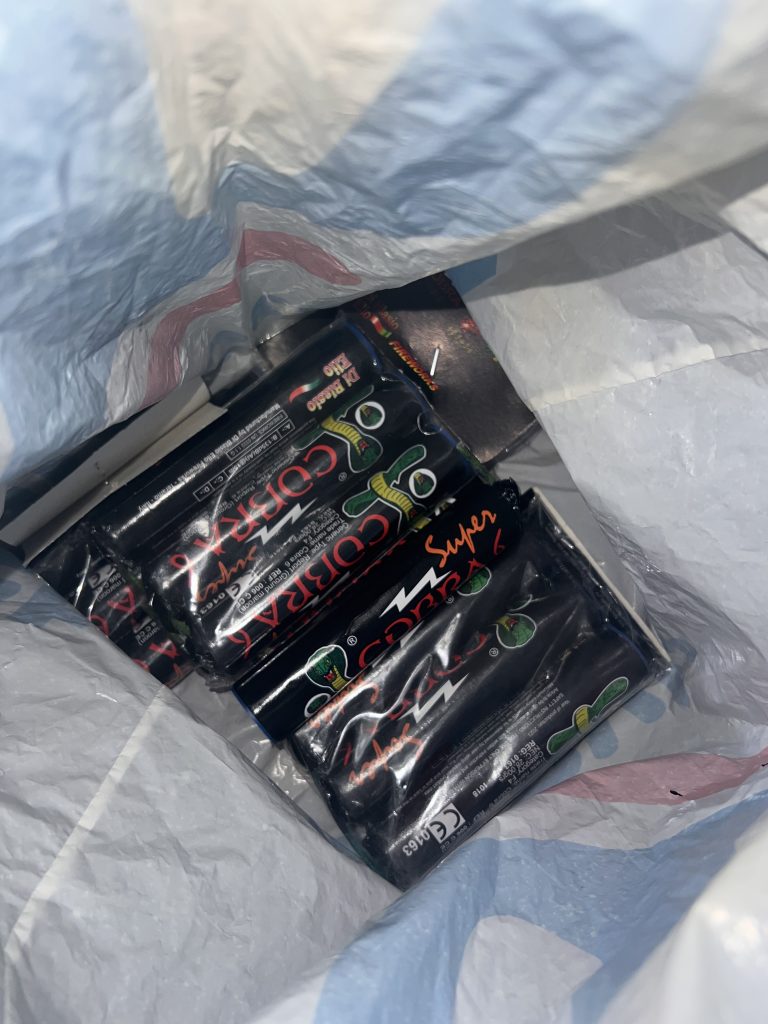
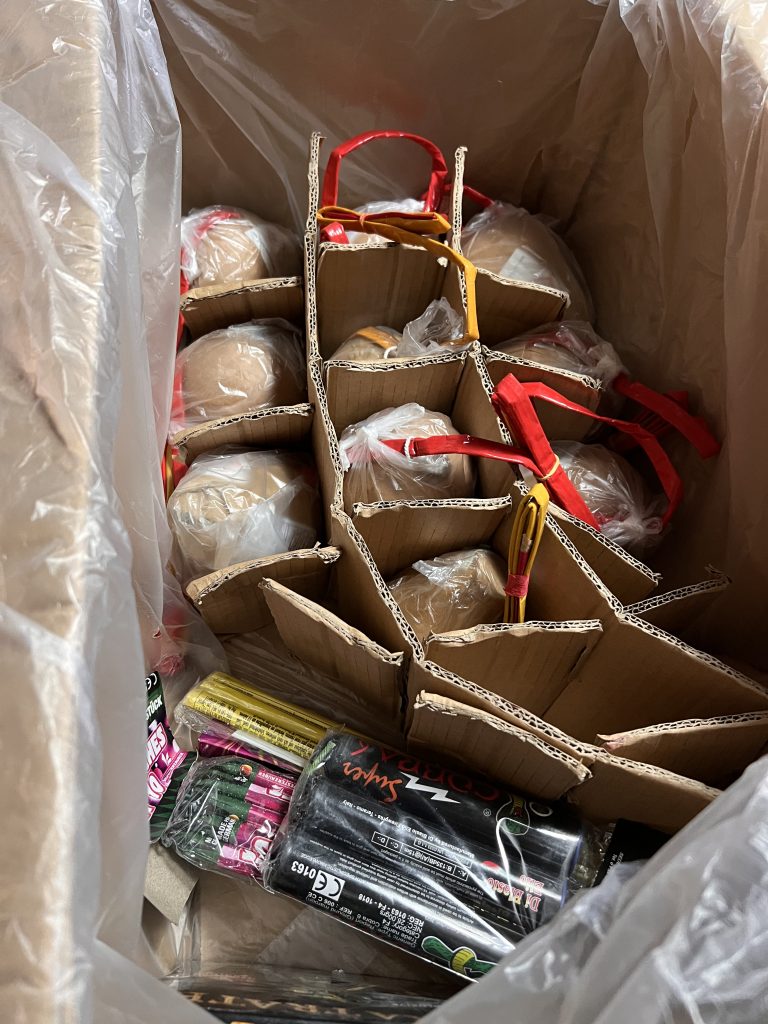
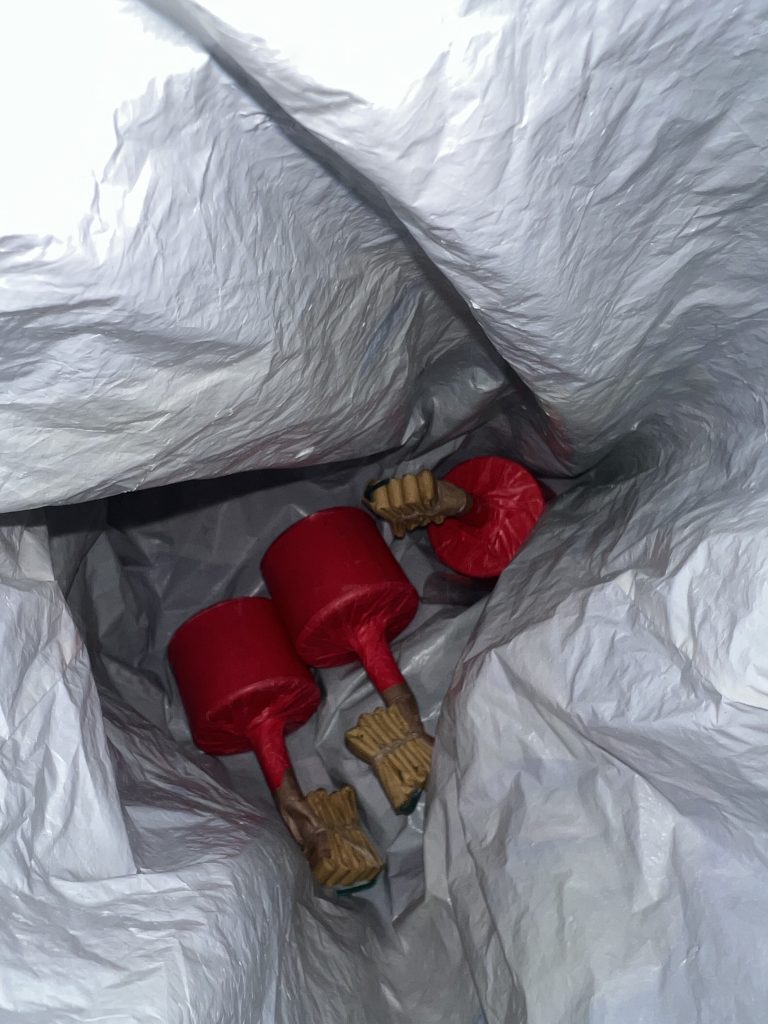
When I ask if he also sells these explosives to minors, his answer becomes vague. “I always judge who I sell to; I need to trust the person, of course.” It’s not exactly an answer to my question, but in a way, it answers it. “When you read in the news about all the accidents caused by this type of fireworks, don’t you sometimes think that you’re a link in the chain that enables people to misuse these explosives on the streets?” I ask Damien. “I don’t feel guilty, not at all. It’s their choice to buy it and then use it irresponsibly or misuse it to blow things up.” “But you sell it to amateurs, and you can expect that those who don’t know what they’re doing will misuse it. What else would they do with explosives?” “Like I said, that’s not my problem. I just want to make my money.”
Once I’m back in my car, the gravity of this illegal fireworks world sinks in. As long as people like Damien have access to this kind of illegal fireworks in these quantities, the accidents won’t stop.
A step toward unity
If the regulation within European law isn’t amended, it will be difficult for European countries like the Netherlands and Germany to combat the illegal fireworks trade. A potential solution to addressing this cross-border issue can be found in a recent initiative by the Benelux countries. During a conference in May 2024, the so-called “pyro-pass” was introduced: a uniform permit for purchasing high-risk fireworks. This system aims to restrict illegal trade and ensure safety within the EU. The pyro-pass is already being applied in the Benelux and offers a clear, controlled purchasing process, making professional, high-risk fireworks accessible only to licensed individuals. This highlights the necessity of European collaboration: if regulations differ by country, borders will remain a weak link in enforcement. Harmonizing this legislation and expanding the pyro-pass to other EU countries, like Italy and Poland, could be a significant step toward addressing the problems caused by illegal fireworks.
At the European level, initiatives also seem to be underway to introduce this pyropass across Europe and to implement other measures against illegal fireworks. Member of the European Parliament Thijs Reuten, who is also a member of the Committees on Foreign Affairs and Constitutional Affairs, submitted a question to the European Commission on January 8, 2025. The question was as follows:
“Does the Commission acknowledge the danger posed by, and the increasing misuse of, powerful fireworks, such as Cobra 6/8, and their role in criminal activities, such as attacks and threats?”
“Given the importance of EU citizens’ safety and well-being, can the Commission say whether, despite the reluctance of some Member States, it will put forward a specific proposal to step up the rules governing powerful fireworks and consider introducing a European PyroPass? If not, why not?”
The Netherlands and France have often taken initiatives for a coordinated European approach, but decisive action remains absent due to a lack of agreement among other member states. For now, it remains to be seen how the European Commission will respond. However, a European approach is becoming increasingly relevant for countries like Germany and Austria after this New Year. That such an approach is essential for a country like the Netherlands is beyond question. As long as illegal fireworks continue to cross the border, people will not stop using them, whether they are banned or not.
